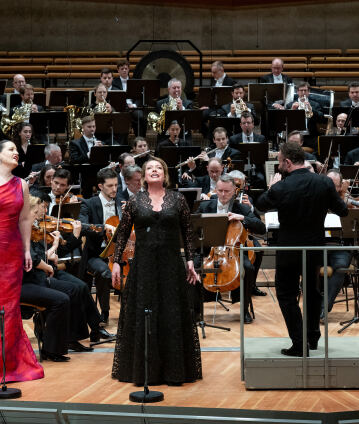Kirill Petrenko conducts Strauss’s “Elektra”

A woman in an exceptional situation: Elektra is driven by grief, pain and hatred. She wants to avenge the death of her father. The tragedy of the Greek king’s daughter was ideal operatic material for Richard Strauss, who describes the psychological profile of a desperate woman in stormy scenes. Kirill Petrenko conducts a concert performance of the opera. Nina Stemme, an acclaimed soloist in dramatic parts, sings the title role.
Elektra is the second opera by Richard Strauss to be performed by chief conductor Kirill Petrenko and the Berliner Philharmoniker at the Easter Festival in Baden-Baden and Berlin. The outstanding cast includes Elza van den Heever and Michaela Schuster, who already contributed to the success of Die Frau ohne Schatten, – and the title role will be sung by Nina Stemme, one of the leading highly dramatic sopranos of our time.
Elektra marked the beginning of the unusually productive collaboration between Richard Strauss and Hugo von Hofmannsthal. In this case, however, the text was not an opera libretto, but the play of the same name by the poet. Hofmannsthal’s interest in the writings of Sigmund Freud left its mark on the psychologically heightened adaptation of the ancient tragedy.
So what happens in the opera? After Klytaemnestra murders her husband Agamemnon with her lover Aegisth, her daughter Elektra’s desire for revenge becomes her only purpose in life. Her brother Orest, who was thought to be dead and has returned from exile, finally kills his mother and Aegisth – and the triumphant Elektra dances herself to death. The ancient power of the original inspired Strauss to write his most ambitious music to date, as he said himself. In Elektra, he “went to the uttermost limits of harmony and psychic polyphony”. Following the cautiously received Dresden premiere in January 1909, Elektra went on to enjoy the phenomenal success in the international music world that it continues to have to this day. However, for his next opera Der Rosenkavalier, Strauss turned to a comedic subject and a less radical musical language.
© 2024 Berlin Phil Media GmbH
Related interviews
Category
Artists
Our recommendations
- Kirill Petrenko conducts Strauss’s “Elektra” at the Easter Festival in Baden-Baden
- Kirill Petrenko with Strauss’s “Die Frau ohne Schatten” in Baden-Baden
- Kirill Petrenko conducts Strauss’s “The Woman without a Shadow”
- Kirill Petrenko conducts Tchaikovsky’s “Mazeppa”
- Kirill Petrenko conducts Tchaikovsky’s “Queen of Spades”
- Simon Rattle conducts “Bluebeard’s Castle”